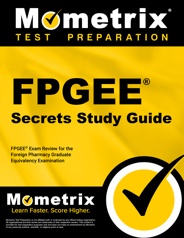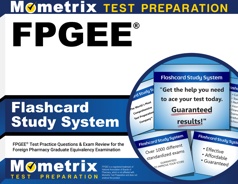The National Association of Boards of Pharmacy (NABP) designed the Foreign Pharmacy Graduate Equivalency Exam (FPGEE®) to assess the knowledge and skills of those pursuing FPGEC certification.
Click “Start Test” above to take a free FPGEE practice test, and check out our premium-quality FPGEE test prep resources by clicking the links below!
FPGEE Exam Outline
The FPGEE exam contains 200 multiple-choice questions, and you will be given a time limit of 4.5 hours.
The exam is split into four content areas.
1. Basic Biomedical Science (10%)
The questions in this area are designed to assess your knowledge and skills related to the following:
Physiology
- Function of the major body systems
- Homeostatic impact at the organ and system level
Biochemistry
- Chemistry and utilization of biomacromolecules
- Enzymology, coenzymes, and kinetics
- Cell chemistry
- Transport and mobility
- Recombinant DNA
- Molecular biotechnology
- mRNA translation and protein synthesis
Microbiology Related to Human Disease
- Structure, function, and characteristics of microorganisms
- Pathogenic microorganisms of humans
Immunology
- Innate and adaptive immunity
- Principles of antibody actions
- Hypersensitivity and types of reactions
2. Pharmaceutical Sciences (33%)
The questions in this area are designed to assess your knowledge and skills related to the following:
Medicinal Chemistry
- Physicochemical properties of drugs in relation to drug absorption, distribution, metabolism, and excretion
- Chemical basis for drug action
- Fundamental pharmacophores for drugs used to treat diseases
- Structure-activity relationships in relation to drug-target interactions
- Chemical pathways of drug metabolism
- Applicability to making drug therapy decisions
Pharmacology and Toxicology
- Mechanisms of action of drugs of various categories including biologics
- Pharmacodynamics of drug binding and response
- Adverse effects and side effects of drugs
- Mechanisms of drug-drug interactions
- Drug discovery and development
- Acute and chronic toxic effect of xenobiotics
Pharmacognosy and Dietary Supplements
- Concepts of crude drugs, semi-purified, and purified natural products
- Classes of pharmacologically active natural products
- Science and regulation of dietary supplements
Pharmaceutics/Biopharmaceutics
- Biopharmaceutical principles of drug delivery to the body via dosage forms
- Materials and methods used in preparation of drug forms
- Physicochemical properties relating to drug entities and dosage forms
- Principles of drug and dosage form stability, including chemical degradation and physical instability
Pharmacokinetics
- Basic principles of in-vivo drug kinetics
- Principles of bioavailability and bioequivalence
- Physiologic determinates of drug onset and duration
Pharmacogenomics and Genetics
- Molecular genetics, genomic, proteomic, and metabolomic principles that serve as a foundation for pharmacogenomics and the genetic basis of disease
- Genetic variants affecting drug action and metabolism, adverse drug reactions, and disease risk that influence the practice of personalized medicine
Sterile and Nonsterile Compounding
- United States Pharmacopeia guidelines on sterile and nonsterile compounding, hazardous drugs, and FDA regulation of compounding
- Techniques and principles used to prepare and dispense individual extemporaneous prescriptions
- Dosage form preparation calculations
- Sterile admixture techniques, including stability, clean-room requirements, sterility testing, and dating
3. Social/Behavioral/Administrative Sciences (22%)
The questions in this area are designed to assess your knowledge and skills related to the following:
Healthcare Delivery Systems and Public Health
- Organization of healthcare delivery systems at the national, state, and local levels
- Healthcare delivery financing in the United States
- Social, political, and economic factors that influence the delivery of healthcare in the United States
- Public health and wellness
- The healthcare delivery system compared and contrasted with that of other industrialized nations
Population-Based Care and Pharmacoepidemiology
- Data sources and analytic tools that provide an estimate of the probability of beneficial or adverse effects of medication use in large populations
- Application of epidemiological study designs to evaluate drug use and outcomes in large populations
- Methods for continually monitoring unwanted effects and other safety-related aspects of medication use in large populations
Economic and Humanistic Outcomes of Healthcare Delivery
- General microeconomic and general macroeconomic principles
- Pharmacoeconomic analysis and its application to improve the allocation of limited healthcare resources
- Humanistic outcomes and their application to improve the allocation of limited healthcare resources
Pharmacy Practice Management
- Management principles applied to various pharmacy practice setting and patient outcomes
- Personnel management
- Planning, including delineation between business and strategic planning
- Marketing of goods and services
- Accounting and financial management
- Budgeting
- Risk management
Pharmacy Law and Regulatory Affairs
- Legal and regulatory principles applied to pharmacy practice
- Administrative, civil, and criminal liability
- Authority, responsibilities, and operation of agencies and entities that promulgate or administer laws, regulations, or guidances related to practice and prescription and nonprescription medication
Biostatistics and Research Design
- Research study designs used in medical research
- Application and interpretation of statistical tests and data collection instruments
Ethical Decision-Making
- Principles of biomedical ethics
- Ethical dilemmas in the delivery of patient-centered care
- Research ethics
Professional Communication
- Communication abilities with patient and caregivers, including empathetic communication
- Communication abilities with other health care providers
- Assertiveness and problem-solving techniques in relation to difficult social and professional conflicts and situations
- Measurement and use of health literacy in pharmacy communications
- Development of cultural competency in pharmacy personnel such that services are respectful of and responsive to the health beliefs, practices, and cultural and linguistic needs of diverse patient populations
Social and Behavioral Aspects of Pharmacy Practice
- Health-, illness-, and sick-role behaviors of patients
- Principles of behavior modification
- Patient adherence to therapies and recommendations
- Caregiving throughout the lifecycle
- Death and dying
Medication Dispensing and Distribution Systems
- Systems for safe and effective preparation and dispensing of medications in all types of practice settings
- Role of automation and technology: pharmacy informatics, information management
- Continuous quality improvement programs or protocols in the medication-use process, including identification and prevention of medication errors, and establishment of error reduction programs
4. Clinical Sciences (35%)
The questions in this area are designed to assess your knowledge and skills related to the following:
Evidence-Based Practice
- Interpreting and evaluating drug information
- Applying drug-information skills for the delivery of medication therapy management
- Evaluating the reliability of various sources of information
- Interpreting guidelines as they apply in a clinical setting
- Utilizing core scientific and systems-based knowledge in the patient care decision-making process
- Utilizing basic science principles in the development and/or implementation of drug treatment protocols and clinical practice guidelines
- Evaluating clinical trials that validate clinical appropriateness
Clinical Pathophysiology
- Applying of concepts of pathophysiology to clinical decision-making
Clinical Pharmacokinetics
- Utilizing pharmacokinetics to calculate, evaluate, and individualize drug therapy
- Interpreting clinical pharmacokinetics of commonly used and low-therapeutic-index drugs
Clinical Pharmacogenomics
- Utilizing pharmacogenomics to calculate, evaluate, and individualize drug therapy
Disease Prevention and Population Health
- Recognizing the proper use of nonpharmacologic therapies
- Describing measures to promote wellness and disease prevention
- Identifying the role of immunizations in disease prevention and health promotion
Patient Assessment
- Describing techniques for obtaining a comprehensive patient history
- Describing how to perform patient physical assessments
- Differentiating between normal physical assessment findings and modifications caused by common disease states and drug therapy
- Interpreting common clinical laboratory values and diagnostic tests
- Performing calculations related to patient assessment
- Describing the use of OTC point-of-care testing devices
Clinical Pharmacology and Therapeutic Decision-Making
- Make therapy recommendations based on dosage calculations, specific uses and indications of drugs and nutritional and support therapy
- Interpret therapeutic drug concentrations
- Assess pharmacotherapy considering contraindications, therapeutic duplications, dietary interactions, adverse drug reactions and interactions, and allergies
- Triage and identify when to refer patients to other health professionals
- Design patient-centered, culturally-relevant treatment plans
- Apply evidence-based decision making to patient care
- Recommend nonprescription and natural product therapies
- Identify and manage drug toxicity, drug-induced diseases, and misuse or abuse
- Monitor drug therapy for misuse, abuse, and non-adherence
Check Out Mometrix's FPGEE Study Guide
Get practice questions, video tutorials, and detailed study lessons
Get Your Study Guide
Registration
In order to sit for the FPGEE, you must submit a completed application to NABP. The application must include the following:
- Proof of licensure or registration to practice as a pharmacist in the region in which you completed your pharmacy education
- A certified copy of your identification card, including a photograph
- FPGEC attestation, including two copies of a full-face, passport-sized photograph
You must also submit an Educational Credentials Evaluators (ECE) application, including official transcripts for any pre-pharmacy, bachelors-level, or post-baccalaureate education, along with official proof of degree completion.
The FPGEC application fee is $100 plus a $650 document evaluation fee. If you need to retake the exam for any reason, you will be assessed an $850 fee, which includes the initial $750 exam fee and a non-refundable administrative fee of $100. If you need to cancel your scheduled exam, you will receive an exam fee refund less the non-refundable $100 administrative fee.
Once your application has been processed, you will receive an authorization to test (ATT). Your ATT will arrive via mail from Pearson VUE and will include instructions for scheduling the FPGEE. Please note that you must wait for your ATT in order to register for the exam, which can be done over the phone or online. Once you have registered for the exam, you will receive an examination confirmation email.
Test Day
In-person Testing
On the day of your exam , you should arrive at the Pearson VUE testing center 15-30 minutes earlier than the scheduled exam time. This will give you extra time to complete the check-in process. When you arrive, you will be asked to sign in and present your photo ID to the proctor. You will be photographed and asked to sign a roster and other rule forms.
Personal items such as your cell phone, wallet, keys, and accessories are not allowed in the testing room, so they should be left at home or placed in a secure locker outside the testing area.
Just before the exam starts, you will be given a brief tutorial on the testing system and will be asked to sign an NDA.
Remote Testing
Before the day of the exam, you should ensure your equipment meets the minimum requirements. You must have a desktop or laptop with a webcam and microphone, and you should take your exam in a private workspace. The exam cannot be taken on mobile devices, smartphones, or tablets. The technical requirements can be detailed on Pearson’s website.
On the day of your exam, you will be asked to show the remote proctor your testing space and submit a valid form of photo ID. The proctor will walk you through the examination process after the check-in process is complete.
How the Exam is Scored
The FPGEE exam is scored using a scaled scoring system. This system takes the number of questions you answered correctly and coverts it to a numerical score on a scale from 0 to 100. You must obtain a scaled score of at least 75 to pass the exam. Note that this does NOT mean that answering 75% of the questions correctly or answer 75 questions correctly equals a passing score.
You should receive your exam results within eight weeks of testing.
Check Out Mometrix's FPGEE Flashcards
Get complex subjects broken down into easily understandable concepts
Get Your Flashcards
FAQs
Q
How many questions are on the FPGEE exam?
A
There are 200 multiple-choice questions on the exam.
Q
How long is the FPGEE exam?
A
The time limit for the exam is 4.5 hours.
Q
What is the passing score for the FPGEE exam?
A
To pass the exam, you must achieve a minimum scaled score of 75.
Q
How much does the FPGEE exam cost?
A
The full examination fee is $750.
FPGEE is a registered trademark of National Association of Boards of Pharmacy, which is not affiliated with Mometrix Test Preparation and does not endorse this page.


